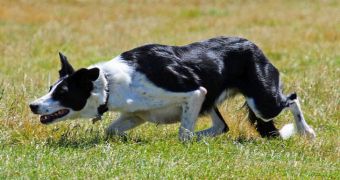There is nothing scientists love more than studying and attempting to explain Mother Nature's little mysteries. The trouble is that, every once in a while, the mysteries that they choose to dissect are, well, too little.
Not to beat about the bush, it turns out that, not too long ago, a bunch of researchers used GPS technology to stalk sheepdogs and try to figure out how such pooches manage to herd the animals that they are entrusted with.
Apparently, this research project was the first of this kind. Otherwise put, the scientists behind it were the first ever to think about using GPS technology to study sheepdogs and attempt to determine how they manage to get their job done.
If you're thinking that the use of GPS devices was the only high-tech part of this study, you could not be more wrong. Long story short, the data obtained with the help of such gadgets was fed into a computer and served to develop a mathematical shepherding model.
According to Phys Org, this investigation yielded some very interesting results. Thus, the GPS technology and the mathematical shepherding model revealed that, when herding sheep, dogs only followed two very simple rules.
As detailed in a paper in the Journal of the Royal Society Interface, the first rule can be summed up as follows: always collect the sheep when they decide to throw a fit and disperse. Here is the second rule: make sure that you drive the sheep forward only when they're aggregated.
“At every time step in the model, the dog decides if the herd is cohesive enough or not. If not cohesive, it will make it cohesive, but if it's already cohesive the dog will push the herd towards the target,” explains researcher Daniel Strömbom with Uppsala University in Sweden.
Some might want to label this investigation a complete waste of time. Still, the researchers who carried it out do not see things like this at all. On the contrary, they say that their findings have the potential to change the world as we know it.
To begin with, they argue that information obtained in this manner could help lead to the development of sheep-herding robots. What's more, their findings might pave the way to better crowd-control techniques, and could even encourage the development of new methods to clean up the environment.
As specialist Andrea King with Swansea University in the UK puts it, “There are numerous applications for this knowledge, such as crowd control, cleaning up the environment, herding of livestock, keeping animals away from sensitive areas, and collecting or guiding groups of exploring robots.”

 14 DAY TRIAL //
14 DAY TRIAL //